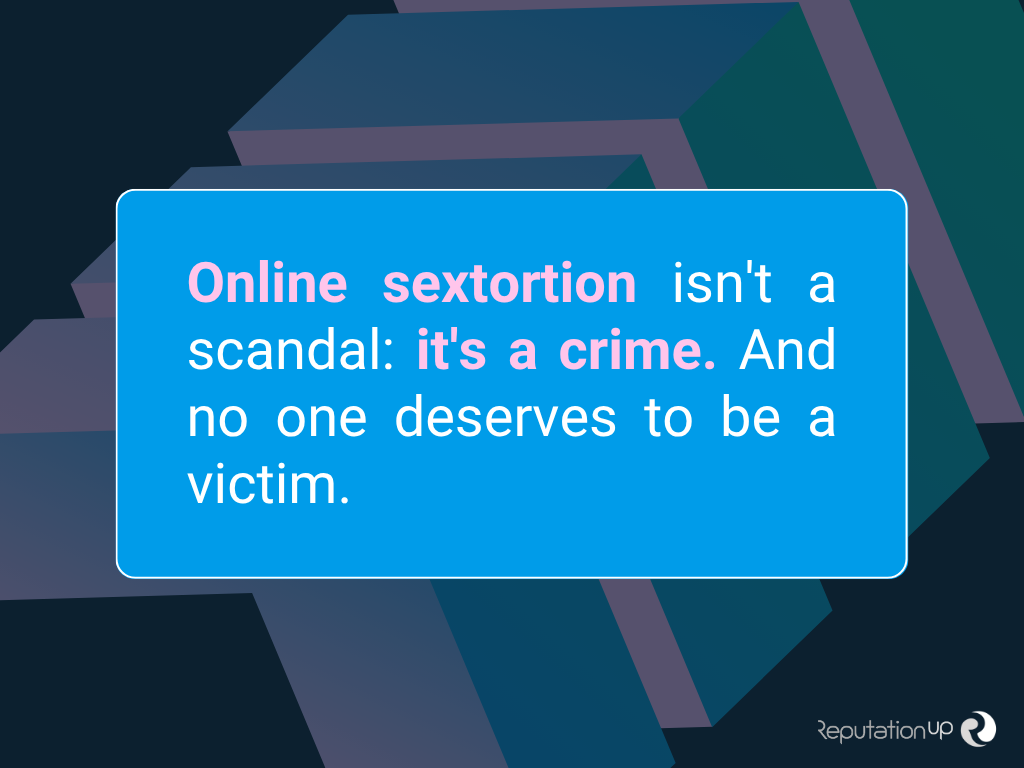Online sextortion is one of the most destructive forms of digital blackmail. It is a threat that combines privacy theft with psychological, economic, and social extortion.
It does not distinguish between age, gender, or educational level. Anyone who has shared intimate content, voluntarily or involuntarily, can become a target of this crime. Although it particularly affects young people and those active on social media, it also affects professionals, public figures, parents, and minors.
In recent years, cases of sextortion have increased globally. The National Center for Missing and Exploited Children (NCMEC) reported 10,731 incidents of financial sextortion against minors in 2022, a figure that rose dramatically to 26,718 cases in 2023, showing an alarming trend compared to previous years.
This article will guide you step-by-step through understanding what online sextortion is, how to respond if you’re already experiencing it, and what strategies to use to stop the blackmail, regain your security, and protect your digital reputation.

What is online sextortion?
Sextortion is a form of cyber extortion in which an attacker threatens to distribute intimate images of a person unless they comply with their demands. These can include money, more explicit material, or personal favors. The threat can come from an acquaintance, an ex-partner, a stranger, or even a criminal network.
In the online world, this practice has evolved: it is no longer limited to personal blackmail. Today, organized gangs manipulate fake profiles on social media, online dating sites, or even employment platforms to gain the victim’s trust and then extort them.
“Sextortion isn’t just a digital crime. It’s a form of deep psychological violence that destroys lives from the screen,” warns Andrea Baggio, CEO EMEA of ReputationUP.
How do extortionists act?
- They deceive the victim with a fake profile or through online relationships.
- They get intimate images or videos.
- They threaten to spread this content if they don’t receive what they demand.
- If the victim agrees, the cycle repeats: they either demand more or resort to financial blackmail.
- If the victim refuses, the attacker may disseminate the material, causing serious reputational damage.
Emotional, legal, and reputational impact
Sextortion doesn’t just steal privacy. It causes severe emotional trauma, damages careers, deteriorates personal relationships, and destroys the victim’s digital image. And most dangerously, many people don’t report it out of shame, fear, or guilt.
Psychological consequences
According to a national survey conducted by Thorn in 2025, approximately 15% of young victims of sextortion reported having self-harmed as a direct result of the abuse. In addition, a study published in arXiv in 2024 shows that a large percentage of victims—up to 40%—report symptoms of depression, intense anxiety, or post-traumatic stress disorder. The stigma associated with intimate exposure intensifies emotional isolation and makes it difficult to seek psychological or legal support, perpetuating the damage and increasing vulnerability to new forms of victimization.
Legal and occupational risks
The dissemination of intimate content can have devastating consequences on the victim’s professional and social life. Even if the material was obtained or shared without consent, many people are unfairly judged in their work, educational, or family environments. The stigma associated with intimate exposure often leads to dismissals, sanctions, loss of academic opportunities, or breaches of professional trust. In contexts where digital reputation is a key component of one’s public profile, a leaked intimate image can ruin years of effort. The victim, in addition to facing the initial aggression, must deal with scrutiny and social revictimization.
According to a report by the Electronic Frontier Foundation (EFF), the exposure of intimate content without consent—including cases of sextortion—can lead to complex legal consequences, both for the victim and for the platforms that host such material. Many jurisdictions still lack effective legal frameworks to curb the rapid spread of this type of content, leaving victims in a state of prolonged defenselessness.

“We receive victims who have lost jobs, contracts, or partners due to blackmail. A digital reputation is as fragile as an image in the wrong hands,” says Juan Ricardo Palacio, CEO of ReputationUP America.
Need help protecting your reputation?
Remove all negative content against your brand and publish positive content that re-launches your digital image
What NOT to do if you suffer from sextortion
Before looking at solutions, it’s vital to understand what mistakes to avoid. The wrong reaction can make the situation worse and strengthen the aggressor’s power.
Do not pay the blackmail
Paying never guarantees that the content won’t be published. On the contrary, it often encourages further extortion. The attacker knows they have control and will exploit it again and again.
Do not give in to threats
Sending more photos or maintaining contact with the extortionist only makes you more vulnerable. The rule is clear: cut off communication as soon as possible.
Do not act alone
Silence, shame, or improvisation all play into the hands of the extortionist. Seeking professional, technical, and legal help is the first step to regaining control.

How to defend yourself and stop digital blackmail
Dealing with a sextortion case requires determination, professional support, and a clear strategy. These are the steps recommended by the experts at ReputationUP.
1. Keep the evidence
Save screenshots, emails, messages, the attacker’s profile, and any evidence of contact. Although it hurts to see the footage, this evidence will be key to reporting and removing the content.
2. Block and cut off communication
Stop replying to messages. Block the extortionist on all platforms. Change your passwords and enable two-step verification to protect your accounts.
3. Report to the authorities
Sextortion is a crime in many countries. File a report with the police or a cybercrime unit. In Europe, Europol offers specific guidelines. In Latin America, many prosecutors’ offices have specialized cybercrime units.
According to a study by Digital Forensics Corp., around 98% of sextortion cases are never reported, which fuels widespread digital impunity. This means that only 2% of victims file a formal complaint, and many remain silent out of shame, fear, or ignorance of the available channels.
4. Contact reputation and cybersecurity experts
ReputationUP offers immediate support to victims of sextortion: case analysis, content removal, attacker tracking, and digital identity protection. Having a legal and technical team can make the difference between chaos and recovery.
5. Work on emotional and reputational restoration
In addition to removing content, it’s key to restore your image and well-being. Reputation is rebuilt with strategic actions: positioning positive content, psychological counseling, and cleaning up your digital footprint.
What can ReputationUP do for you?
ReputationUP leads the fight against online sextortion in Europe and Latin America. Its dedicated team works with absolute confidentiality to protect the identity of victims and reverse reputational damage.
We offer:
- Immediate attention in cases of sextortion
- Harmful links removal, including intimate videos and photos
- Tracking and reporting the extortionist
- Shielding of accounts, networks and search engines
- Online reputation management and digital identity restoration
- Professional emotional and legal support
“You are not alone. No one deserves to be judged for their privacy. Dignity is also defended online,” says Andrea Baggio.
Need help managing and improving your online reputation?
60% of users say they don’t trust people or businesses who receive negative comments or reviews
Conclusion
Online sextortion is not a mistake or a mistake. It’s a crime that uses privacy as a weapon and fear as a prison. The victims are not guilty. They are people trapped in unjust blackmail, which deserves to be confronted with justice, empathy, and professional action.
Protecting your digital reputation means protecting your freedom, your peace of mind, and your future. Because on the internet, every click can make or break you. And you have the right to decide what story is told about you.
If you’re experiencing sextortion or know someone at risk, contact ReputationUP. The first step to overcoming fear is not to do it alone.
Frequently Asked Questions (FAQ)
It’s blackmail that uses intimate images as a threat to obtain money, favors, or more explicit content.
No. Paying only strengthens the abuser’s power and rarely stops the blackmail.
Yes. There are legal and technical mechanisms for removing them. ReputationUP offers this specialized service.
In Europe, the GDPR and the Penal Code. In Latin America, laws such as Habeas Data and cybercrime regulations apply in several countries.
Yes. With professional help, you can remove the content, position new, positive information, and strengthen your online presence.



